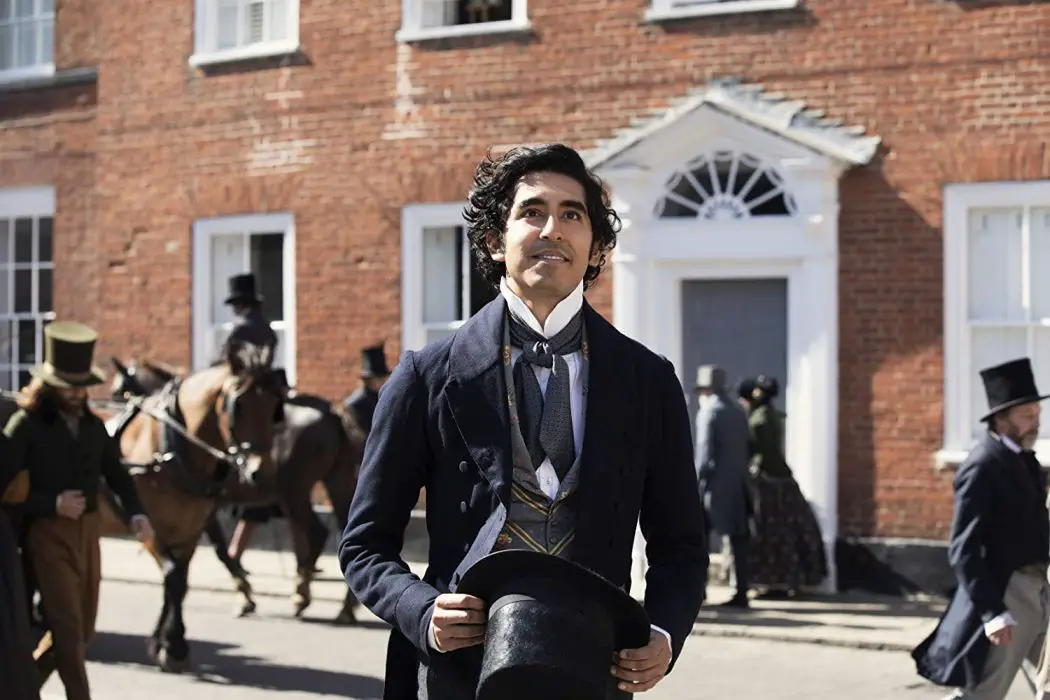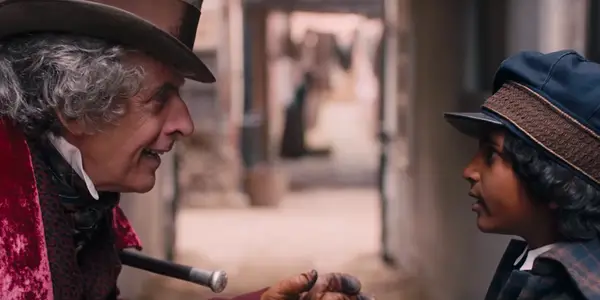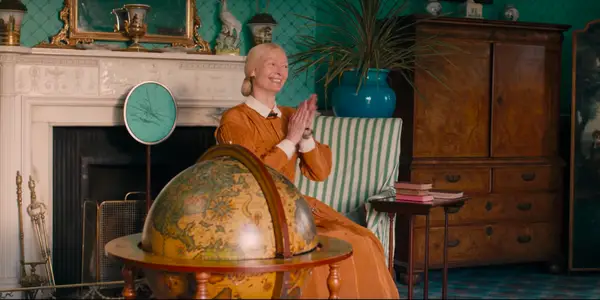THE PERSONAL HISTORY OF DAVID COPPERFIELD: Back To The Past

Going into Armando Iannucci‘s take on “David Copperfield,” you’d be forgiven for expecting, well, something else. The Scottish writer/director has largely been known for crafting expletive-filled insults on shows like Veep and The Thick of It, and while his latest may appear on the surface to be a departure from those stylings, The Personal History of David Copperfield still finds ways to use language to inform us about each character and deliver some solid laughs along the way. It also shows that without his trademark sweary rants, Iannucci‘s use of words makes him a surprisingly good fit for Dickens, even if the film itself feels just a little too slight for its own good.
The story opens with Copperfield (Dev Patel) as an adult, recounting his life’s story to a captive audience, before (quite literally) stepping back into the past to the beginning of his story. From here we’re introduced to a staggering ensemble of assorted British actors, with the likes of Tilda Swinton, Peter Capaldi, Hugh Laurie, John Boyega, Gwendoline Christie, Benedict Wong, Ben Wishaw, and many more, portraying the family, friends, mentors, and adversaries that make up the tapestry of David’s life. Many of the eccentric characters he falls in with try to mold him in some form, whether it’s in the way he talks, the way he treats others, or most significantly, his name.
What’s In a Name?
At various points, David is given names like Trotwood and Daisy, names that he accepts at first but becomes increasingly eager to shed as time goes on. The story becomes about him not only forging his own path, but about defining himself and owning the name David Copperfield. He must come to terms with the experiences he’s had and the people he’s encountered, and ultimately understand how they’ve all fundamentally impacted the man we meet at the beginning of the film. The way he does that is, of course, by writing about them, assembling a lifetime’s worth of scribbles, scraps, and memories to form the complete story, from birth to adulthood.

Along the way, David falls in with numerous family settings—from the kindly Peggottys living in an upturned boat, to a family led by conman Mr. Micawber (Capaldi) living on the edge of bankruptcy—eventually leading him to his wealthy aunt, Betsey Trotwood (Swinton), who lives in constant fear of the donkeys encroaching on her property.
After a place-setting first act, it’s here that the film starts to find a groove—most notably in the story of Mr. Dick (Laurie), Betsey’s shut-in cousin who’s haunted by the thoughts of the beheaded King Charles I. Iannucci takes a potential caricature and approaches him with care and empathy, while Laurie brings an introverted quietness to the character, while still being willing to go big when the film demands it. His friendship with David gives both characters an outlet to express themselves—whether it’s David putting his experiences into writing, or Dick releasing the King’s thoughts to the wind by attaching them to a kit—and gives this section of the film a strong emotional resonance.

But it’s not for long, as David is soon shipped off to an upper-class school, where he’s forced to hide his time as a factory worker in London from his new friends. The way characters use language becomes a key component of the narrative, whether it’s David adapting to each new environment or Micawber posing as a teacher at David’s school, trying and failing to play the part. Even a pivotal turning of the tables revolves around Dick’s comprehension of the written word.
A New Perspective
Iannucci tells this story with an admirable level of confidence, using eye-catching transitions like a hand crashing through a drawing of a happy memory or the pulling of a curtain taking us from one location to another. The film’s casting is entirely color-blind in an effort to bring a contemporary feel to the story, highlighting that neither our past nor our present is at white as many a period piece would have you believe. But it also doesn’t shy away from the downside of modern Britain either, with homelessness and poor living conditions being at the forefront of the narrative.
The director also makes excellent use of certain locations, highlighting how huge the world can feel at a young age and the reality that hits you in adulthood. The most notable of these being the boathouse the young David briefly lived in, which is cleverly shot from his perspective, both as a child full of wonder and an adult who now can’t even get around the place without constantly bumping his head.

Unfortunately, the film does suffer from some pacing issues, with the third act being particularly hasty to get to the end, leaving certain characters and plot points feeling lost in the rather chaotic shuffle. Big moments of character development feel chopped up or exorcised entirely, to the point where some resolutions feel perfectly acceptable, if not entirely inevitable based on what came before. The first act can also feel just a little too slight in its execution, with David bouncing from one place to another, without really settling into any one of his new homes.
Final Thoughts on The Personal History of David Copperfield
Still, the film displays much of Iannucci‘s sharp comic wit, from wordplay to some terrific physical comedy, that the ensemble pulls off with remarkable ease. It’s a truly sincere, heartfelt retelling of Dickens’ story, one that taps into a new contemporary edge and presents itself in a distinctly cinematic fashion, even if the storytelling falters along the way. And it all hangs together through a wonderful, magnetic performance from Dev Patel, who acts as our anchor through the weird and wonderful world that makes up The Personal History of David Copperfield.
The Personal History of David Copperfield is out now in the UK and opens May 8th in the US.
Does content like this matter to you?
Become a Member and support film journalism. Unlock access to all of Film Inquiry`s great articles. Join a community of like-minded readers who are passionate about cinema - get access to our private members Network, give back to independent filmmakers, and more.













